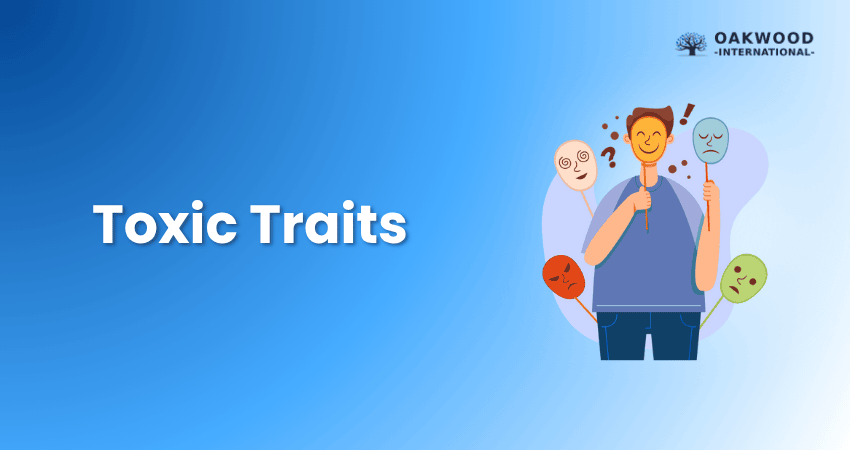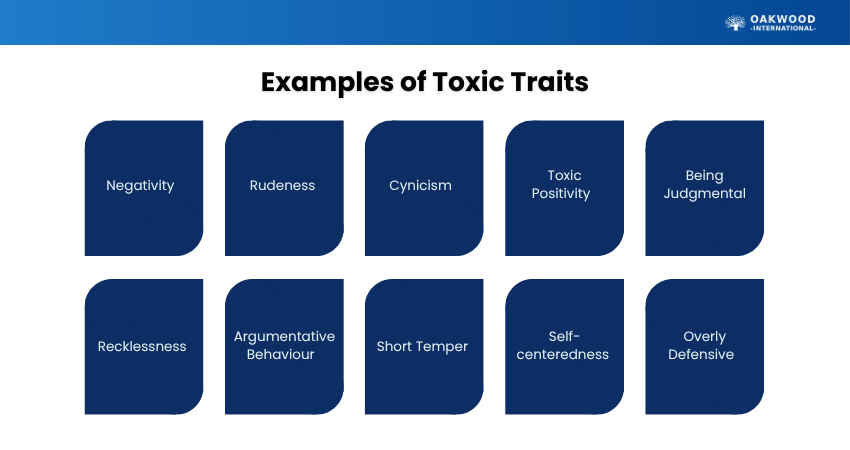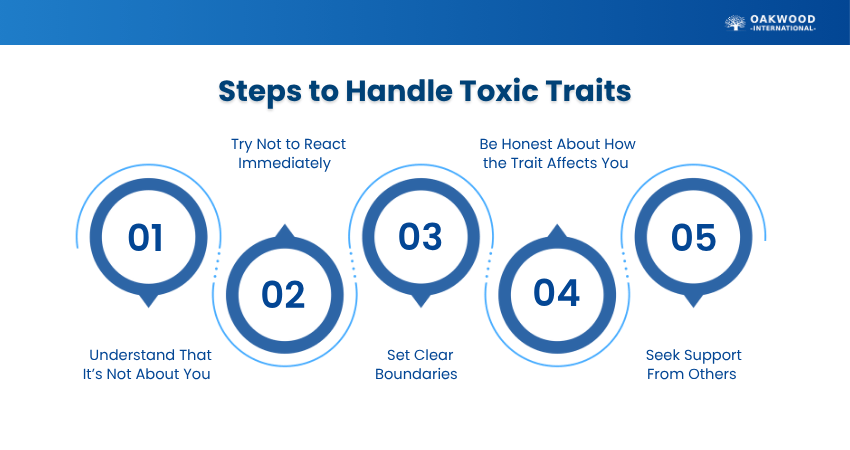Table of Contents


We all recognise Toxic Traits in others; the constant complainer, the arrogant colleague, the friend who never apologises or the family member who loves sparking arguments. But what if some of these habits quietly exist in us too? The truth is such traits aren’t always obvious.
They can hide in everyday behaviours, slowly draining relationships and mental well-being. In this blog, we’ll uncover 22 Toxic Traits you might be overlooking in yourself and those around you. It'll help shine light on patterns worth recognising and transforming. So read on and root out those habits that might be holding you and others back!
Table of Contents
1) 22 Examples of Toxic Traits
2) Negativity
3) Rudeness
4) Cynicism
5) Toxic Positivity
6) Being Judgmental
7) Recklessness
8) Argumentative Behaviour
9) Short Temper
10) Self-centeredness
11) Overly Defensive
2) How to Handle Toxic Personality Traits in Relationships and at Work?
3) Conclusion
22 Examples of Toxic Traits
This section uncovers all the Toxic Traits that quietly sabotage relationships, teams and personal growth. Recognising these traits is the first step toward transformation. Let's dive in:

1) Negativity
This is one of the most common Toxic Traits. Someone with negativity will view the world as a harsh, unkind and unfair place. They often complain, ruining everyone's enjoyment or dampening others’ spirits through pessimistic remarks and discouraging behaviour.
2) Rudeness
An individual who exhibits rude behaviour might speak or act without regard for commonly accepted manners. For instance, they may address a server without using polite expressions like "please" or "thank you."
3) Cynicism
Someone who shows cynicism often believes that people are driven by self-interest at the expense of others. For example, they might assume a friendly server is courteous only to get a larger tip.
4) Toxic Positivity
While persistent negativity can drain people, the opposite extreme can be equally harmful. Toxic positivity involves forcing optimism and denying real emotions. Although positivity can motivate teams, ignoring genuine issues or saying “just stay positive” may prevent honest communication and emotional support.
5) Being Judgmental
A judgmental person is known to form opinions about people or situations without any firsthand understanding. For instance, a friend might insist a concert will be dull before even attending or listening to the artist's catalogue.
6) Recklessness
A reckless person ignores all the potential risks that their actions can create for themselves or the people around them. For example, they might encourage you to engage in an unsafe activity without caring about how dangerous the consequences can be.
7) Argumentative Behaviour
An argumentative individual enjoys provoking disputes or unnecessarily challenging others. For example, they might pick apart a family member’s idea just to spark a quarrel. While healthy debate can be useful, arguing purely for the sake of enjoying conflict can be harmful.
8) Short Temper
This Toxic Trait is among the most hostile. A person who's quick to anger or short-tempered typically becomes upset due to triggers that would offend most people. For instance, a colleague may get angry quickly when you point out a simple mistake and struggle to calm themselves down.
9) Self-centeredness
A self-centred person prioritises their own desires over the needs of others. For instance, a self-centred friend will avoid comforting someone in distress because they prefer to focus on their own activities instead. It’s one of those Toxic Traits that can create irreversible isolation.
Develop the human edge in your organisation with ease. Sign up for our Human Capability Development Program Course now!
10) Overly Defensive
Toxic individuals are known to react defensively and struggle to accept any constructive feedback. They may quickly become upset when their actions are questioned. This creates barriers to open communication, proper problem-solving and personal or professional growth.
11) Jealousy
Toxic individuals get consumed by jealousy easily. They resent others’ achievements or happiness. They may appear supportive, but deep down, they feel upset that it wasn’t their success. This envy can fuel unhealthy competition and negativity, and contribute to a toxic, discouraging environment.
12) Laziness
A lazy person finds it very difficult to complete tasks mainly because of a lack of motivation or inspiration. For example, an employee might deliberately put off their responsibilities simply because they don't want to do them. This kills productivity and can impact a team’s efficiency.

13) Rarely Apologising
Toxic individuals barely admit fault and they rarely offer any genuine apologies. Instead, they deflect blame, make excuses and divert attention to others. Such avoidance of accountability impacts any chance of reconciliation and makes it difficult to maintain healthy relationships.
14) Stinginess
A stingy person may be unwilling to share their time, belongings or money, even when it’s fair or deserved. For instance, a stingy relative or friend might find excuses not to cover their share of a restaurant bill.
15) Hostility
This trait is marked by persistent anger or resentment toward others. Hostile individuals can be easily provoked. They are prone to arguments or insults and struggle with emotional control. Such behaviour is fertile ground for tension and damaged communication. It can create a harmful cycle of conflict and emotional insecurity.
16) Avoiding Responsibility
Refusal to take responsibility for one’s actions is an obvious indicator of toxic behaviour. Such individuals always shift the blame onto others or external factors to escape being held accountable. For example, if they break a plate, they may argue that it happened because you placed it incorrectly. Consistently avoiding responsibility blocks self-improvement.
17) Avoiding Conflict
Conflict avoidance occurs when people ignore issues to maintain peace. Though it may seem kind, it often leads to resentment and unresolved tension. Addressing problems early helps build healthier communication.
18) Being Disruptive
A disruptive person may interrupt and speak over others. They create disturbances for their own benefit. For instance, an employee might play loud music in the office. Such behaviour distracts those around them, resulting in lowered productivity.
19) Thoughtlessness
A person who is thoughtless doesn't consider how their actions or words may affect others. For example, a family member may tell your extended family a secret someone shared with them in confidence.
20) Dishonesty
Someone who demonstrates dishonesty will deliberately lie or mislead others. While lying is a specific act, dishonesty reflects a consistent pattern of behaviour. Many individuals resort to dishonesty as a way of coping with difficult situations.
21) Acting Superior or Entitled
Toxic individuals frequently exhibit a strong sense of entitlement and superiority. They live under the assumption that they are always right and smarter than others. This behaviour creates frustration, isolation and an unhealthy imbalance of power in relationships.
22) Passive-aggressive Behaviour
This behaviour refers to the act of expressing anger or frustration indirectly rather than openly addressing it. For example, a passive-aggressive colleague may let fly some sly remarks about your work instead of voicing their concerns. In relationships, they might sulk rather than admit that they are upset. Such behaviour can reflect strained relationships and difficulty in expressing emotions.
Become the go-to builder of high-performing teams. Register for our Successful People Management and Team Leadership Course now!
How to Handle Toxic Personality Traits in Relationships and at Work?
Here’s how to handle Toxic Traits in relationships and at work:

1) Understand That It’s Not About You
1) Toxic behaviour often reflects the other person’s insecurities or personal struggles
2) Don’t take their negativity personally
3) Stay calm and remind yourself that their actions don’t define your worth
4) Focus on what you can control your reactions and boundaries
2) Try Not to React Immediately
1) Avoid responding with anger or frustration
2) Pause, take a deep breath, and think before speaking
3) Walking away briefly can help you cool down
4) Respond later with a clear and composed mindset
3) Set Clear Boundaries
1) Decide what behaviour is unacceptable
2) Communicate your boundaries politely but firmly
3) Follow through with consequences if they are crossed
4) Boundaries protect your emotional well-being and self-respect
4) Be Honest About How the Trait Affects You
1) Use “I” statements to express your feelings clearly
2) Example: “I feel disrespected when you raise your voice”
3) This avoids sounding confrontational and encourages reflection
4) Honest communication can sometimes inspire behavioural change
5) Seek Support From Others
1) Talk to trusted friends, family, or colleagues for advice
2) Sharing your experiences helps relieve emotional stress
3) Getting an outside perspective can help you handle things wisely
4) If needed, seek guidance from a counsellor or mental health professional
Conclusion
Toxic Traits don’t just harm relationships. They hold us back from growth and true happiness. By noticing these behaviours in ourselves and others, we can gain the power to change. Awareness is the first step and action is the next. It's about breaking the cycle, nurturing healthier habits and creating spaces where respect and positivity thrive.
Know your rights and shape your workplace with our comprehensive and up-to-date Employment Law Courses - Sign up now!


 Back
Back



 Back to Catagories
Back to Catagories





 + 44 7452 122728
+ 44 7452 122728










